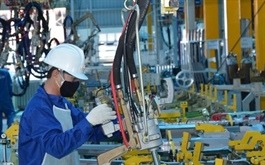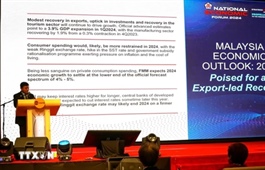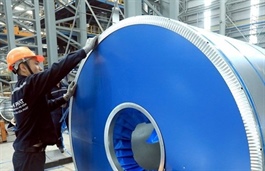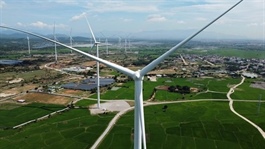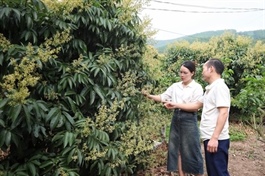Vietnam in need of US$12 billion for EV infrastructure: HSBC
Vietnam in need of US$12 billion for EV infrastructure: HSBC
By leveraging collaborative relationships and overcoming barriers to electric vehicle adoption, Vietnam has the potential to accelerate its green transportation race.
The estimated investment required to provide enough charging stations to facilitate the widespread adoption of electric vehicles (EV) in Vietnam is around US$12.3 billion, according to HSBC.
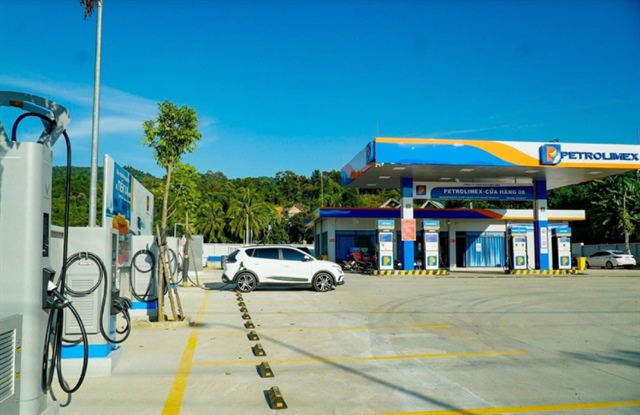
Vinfast's charging points near a gas station. Photo: Vinfast |
HSBC's report "Vietnam At A Glance: The EV Story" states that Vietnam's electric vehicle market has significant untapped potential, considering that over 60% of the population currently owns motorcycles, while car ownership stands at 5.7%.
Previously, the Vietnam Automobile Manufacturers Association (VAMA) predicted that there would be 3.5 million electric vehicles on the roads by 2040.
However, HSBC believes that manufacturers will face challenges in popularizing electric vehicles due to consumer reticence related to limited charging infrastructure coverage, high battery costs, and vehicle prices.
The bank therefore believes that infrastructure development is key to the growth of electric vehicles. HSBC estimates that Vietnam will need around $12.3 billion in investment and 14 terawatt-hours of cumulative energy by 2040 to establish an adequate number of charging stations and renewable energy capacity for electric vehicles.
Currently, there are nearly 150,000 electric vehicle charging points across the country, according to the Vietnam Electricity Group (EVN). However, these stations are primarily located in apartment buildings, shopping centers, parking lots, and gas stations.
Charging stations along highways are sparse. Increased investment in charging stations in these areas would therefore give users more confidence in choosing electric vehicles as their primary mode of transportation. Alongside infrastructure, price barriers could be addressed through tax policies and subsidies for buyers, noted the report.
So far, Vietnam has reduced import taxes, waived registration fees for buyers, and reduced corporate income taxes for investments in these types of vehicles.
The Ministry of Transport once proposed a $1,000 subsidy for each electric vehicle buyer, but the Ministry of Finance opposed it. By comparison, in Southeast Asia, Thailand is offering subsidies of up to $2,900, and Indonesia discounted 36,000 electric passenger vehicles in 2023 by 25-50%.
Additionally, the ecosystem of this sector could be strengthened by tapping into the world's second-largest reserves of rare earth minerals globally and working with foreign businesses in the supply chain, according to HSBC.
There have been some developments. VinFast's parent company has partnered with Gotion High-Tech (China) to develop various types of LFP (lithium iron phosphate) batteries and is building two battery factories in Ha Tinh, expected to be operational in the third quarter.
In early April, China's Chery Automobile announced the construction of an $800 million electric vehicle factory in a joint venture with Geleximco. The plant in Thai Binh is expected to have a production capacity of 200,000 vehicles per year upon completion in the first quarter of 2026.
By leveraging collaborative relationships and overcoming barriers to electric vehicle adoption, Vietnam has the potential to accelerate its green transportation race, HSBC research concluded.
While the automobile sector still faces many challenges, the electric motorcycle market is expected to be more favorable due to its affordable price range and high localization rate. Vietnamese consumers are also familiar with motorcycles, with one new car for every 30 motorcycles. However, HSBC predicts that sales of this type will plateau by 2030 as the market becomes saturated.
As the electrification of two-wheelers progresses, the market share of Japanese companies is expected to decline as they are replaced by domestic manufacturers. Currently, notable domestic electric motorcycle manufacturers include VinFast, Selex Motors, and Dat Bike.
Overall, HSBC predicts that the electric vehicle market in Vietnam (including motorcycles and cars) will reach 2.5 million units by 2036, more than double the current figure.









